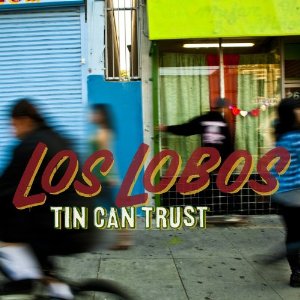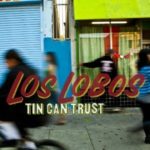
Los Lobos Tin Can Trust (Shout! Factory)
David Hidalgo & Louie Perez The Long Goodbye (Big Stink Research Records)
*****
Let’s do some quick math here, boys and girls: the core of Los Lobos – Louie Perez (guitar, drums, vocals), David Hidalgo (guitar, violin, accordion, percussion, vocals), Cesar Rosas (guitar, vocals) and Conrad Lozano (bass, vocals) – has been playing together since 1973, okay? (Steve Berlin – keys and saxmaster – joined the gang in 1984.)
So if I take 2010 minus 1973, that’s … 37 years. 37 years and counting, folks, as Los Lobos’ new Tin Can Trust shows no sign of this band running out of steam. In fact – tambora roll, please – Tin Can Trust may be one of the band’s best beginning-to-end albums ever. This is not the work of a band who’s buying time by sounding like themselves – this is the work of a band still playing with their hearts and souls right out there … feeling it, pushing it, living it.
Spin that thing and dig: “Burn It Down” is both classic Lobos and fresh Lobos at the same time. A lone acoustic guitar begins the proceedings, chugging away at the tune’s ominous-sounding main riff until – wham – the drums and bass start their relentless pulse behind it. Hidalgo takes the lead vocal on “Burn It Down”, doing that thing he’s been doing for decades: keeping his tone totally in control and cool while managing to nail the song’s emotions at the same time. Guest Susan Tedeschi joins in on the choruses, helping to push things a little further. Two verses, two choruses, then a short burst of crazy-ass guitar – just a warning shot – before things swing into the chorus again. There’s a momentary breather as the lone acoustic steps to the forefront again; then the band swings into the final verse and the final chorus before things just explode into a total guitar squall of Nels-Cline-having-electroshock-therapy proportions that’s guaranteed to make you flinch the first time through. “Where the hell did that come from?” you’ll ask yourself. No matter – in a minute it’s over and the Lobos move on to other prey.
“On Main Street” is all about that East L.A. groove: a little Muscle Shoals; a little Asbury Park; a little Austin; a little Chicago. Only complaint you’ll have is that the cut fades just as Steve Berlin’s sax is taking off. There are those fun moments of letting the traditional roots join the party (“Mujer Ingrata” and “Yo Canto”); there’s a moment that almost sounds like a Widespread Panic power ballad (“All My Bridges Burning”); and there’s even a glorious mess of a blues jam (“Do The Murray”) that lurches, shakes, and shimmies its way through a “What’d I Say”-style rhythm, threatening to take out a couple of amps in the process.
The title cut is nothing short of lovely: ultra-cool low-gear drums and bass lope along with a groove that’s sweet and nasty at the same time. Hidalgo testifies for a couple of verses, then steps back for a guitar break with a hot-knife-through-butter tone. Back to a final round of vocals before some more savage blues guitar takes things home – dry as a bone with a faceful of tube stink.
And what have we here? Who dares to take on the Dead’s “West L.A. Fadeaway”? Why, Los Lobos, of course. Remember their killer version of “Bertha” on Deadicated? These guys not only shared the stage over the years with Jerry and the gang, they also shared the vibe. In their hands, “West L.A. Fadeaway” becomes a total guitar snakefest, sounding just as greasy as Garcia and Hunter intended it to be in the first place.
“27 Spanishes” closes things out with cool layers of rhythm coming at you from all angles and a raw-voiced switchblade guitar that sounds like it was recorded in a midnight stairwell. Things evolve into a percussion jam that takes you safely home as it fades away … nice. No doubt about it: the wolf has not only survived, but is thriving. Los Lobos’ playing on Tin Can Trust has all the passion and fire of youngsters – but is loaded with the kind of soul that only comes from living life. This is a helluva album.
Speaking of living life, you can actually take Los Lobos’ roots all the way back to 1970 (that’s 40 years, boys and girls, in case you’re still doing your ciphering) when Louie Perez and David Hidalgo first began making music and writing songs together in high school. The Long Goodbye is a celebration of those decades of creativity, offering a collection of previously-unreleased Hidalgo/Perez-penned tunes plus one heart-tugging spoken-word piece by Perez.
The album’s nine songs come across like a classic Doug Sahm album, offering up everything from a little bit of just-right twang with killer chord changes (“When Love Fails”) to just-plain-rock-n-roll crunch (“Don’t You Know”). “When The Hands Fall Off The Clock” is just good fun, featuring Hidalgo’s muscular accordion work, while “Cure For Love” has the vibe of a Marvin Gaye classic with some flutters of cool blues guitar scattered throughout.
Many songs are driven by some great natural sounds: catch how Perez wails that big bass drum off Hidalgo’s rhythm work on “Big August Moon” – or how the acoustic guitar provides the solid underpinnings for the powerful ponderings of “What Good Is Love”. “Take My Hand” finds things stripped down to just a voice, a guitar, and a heart as Hidalgo lets it fly on his own. And speaking of moments that’ll turn you inside out, Louie Perez’ “In 1964” is beautiful barrio poetry – the perfect prologue to the album’s title track. While “The Long Goodbye” is a song about life in East L.A., the emotion is universal … which is the key to the songwriting talents of Hidalgo and Perez. Though they have remained true to their roots all these years, their music is as all-embracing and real as life, love, and loss are. The Long Goodbye does a fine job of capturing that feel.



No Comments comments associated with this post